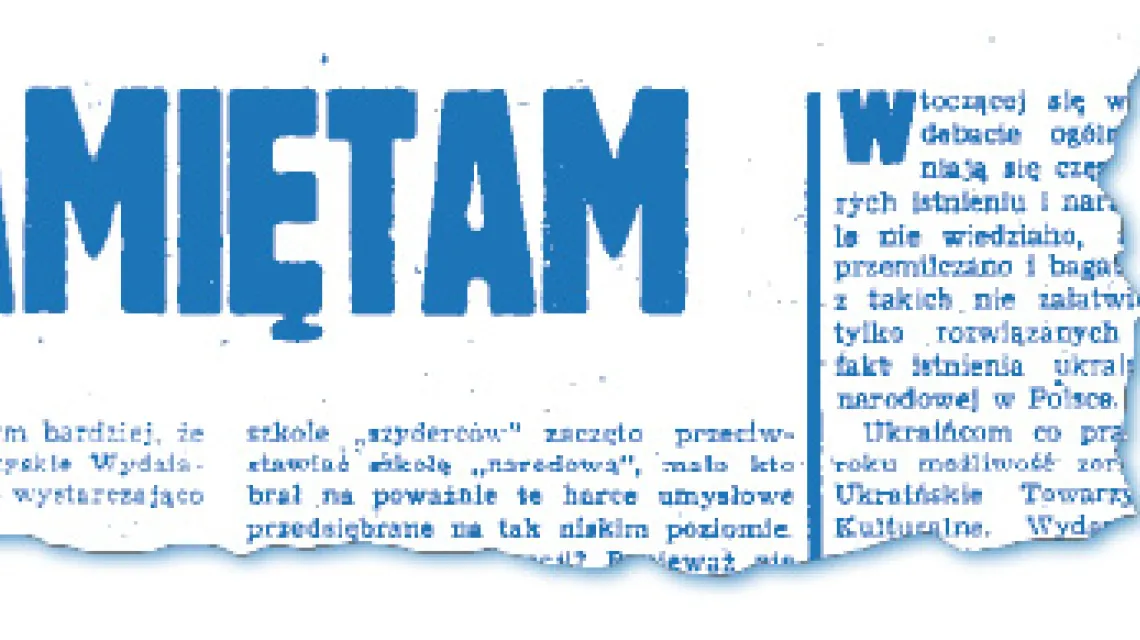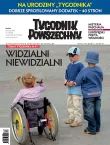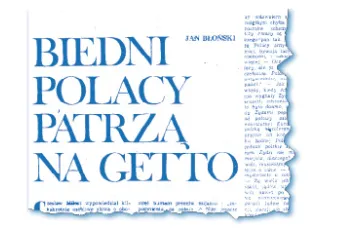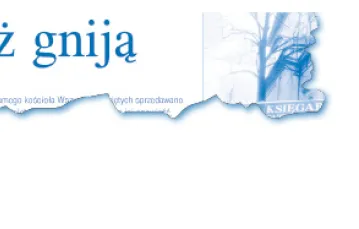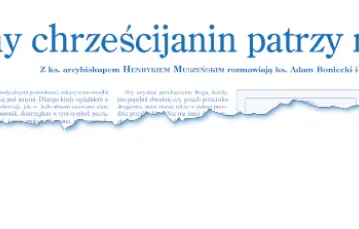Wykupienie dostępu pozwoli Ci czytać artykuły wysokiej jakości i wspierać niezależne dziennikarstwo w wymagających dla wydawców czasach. Rośnij z nami! Pełna oferta →
Marcin Król’s article appeared in Tygodnik Powszechny No. 46/81, at the height of the Solidarity movement. State censorship had hitherto prevented the publication of such an honest coming to terms with the anti-Semitic and anti-intellectual campaign of March 1968.
In issue 13/68, under the heading »Image of the Week," it had been possible only to report the famous address by Władysław Gomułka in Warsaw’s Congress Hall,» "In a wide-ranging address (at a meeting of party activists in Warsaw), he justified the decision to ban the staging of [Kazimierz] Dejmek’s production of Mickiewicz’s Dziady [Forefathers’ Eve], launched a sharp critique of the discussion and resolution adopted at the Warsaw Branch of the Polish Writers’ Union, and presented the views of the highest organs of the [Communist] party about the conduct and demonstrations of students in Warsaw and other universities. The student strikes and demonstrations were brought to a halt"; beneath this there appears information about the suspension from the University of Warsaw of professors Baczko, Bauman, Brus, Kołakowski, Morawski, and Maria Hirshowicz.
The forced emigration of Jews, academics and cultural figures described here saw tens of thousands of people leave Poland.
Stazione Termini. I’m running to get something, then we’re sitting on a bench. They are getting on the train to Paris, whilst we are due to fly back to Warsaw the following day. Farewell to friends. We spent whole weeks together; in the evenings we had endless conversations, easy and open, the sort that only happen between people who have known each another for years, the sort in which there is no need to begin at the beginning or care about the rules of intellectual engagement. Before: similar evenings in America, living together in New Haven, the relentless intensity of New York. After: letters, sometimes short telephone conversations.
Why, immediately after parting, did the distance between us stop being merely geographical? Who erected the barrier? Where did it come from? And how is it that a journey abroad should in an instant mean that those close to one another can no longer communicate normally? That they immediately begin to live in different worlds and that only by nurturing their relationship with exceptional care are able to maintain that closeness? When did it begin and what happened to our lives that, with half of our friends, daily, genuine contact is so difficult that they can recall only trips to the mountains in autumn, the taste of wild mushrooms fried on the stove, or the mood of night-time conversations in Warsaw?
I am relying solely on my own memory, not historical memory, so I shall neglect earlier emigrations. I remember only one emigration and my recollections stretch back barely a few decades. I was studying then at Warsaw University’s Department of Philosophy, before working there as a research assistant for a few years. The department was in a building next to the Church of the Holy Cross on Krakówskie Przedmieście. Before the war, it had been a school and we listened to lectures seated on uncomfortable benches in gloomy lecture halls with old blackboards. In the dark corridors and equally murky lecture rooms, we spent whole days having no doubt silly conversations. The atmosphere of that time has been well described by B.T. in Res Publica No. 5.
In 1964, I witnessed a mass meeting for the first time. Two events occurred: the so-called "Letter of 34," in which leading Polish artists and intellectuals wrote to the Prime Minister lamenting the shortage of paper, and the "Open Letter [to the Party]" by Kuroń and Modzelewski, a document that seemed to me then (and still does today) somewhat enigmatic. I was in the third year of my studies when public affairs began to have an impact on me. The atmosphere in the department was dissenting, but I wanted to actually do something, to protest against something. When Kuroń and Modzelewski were arrested and convicted, groups of students emerged (some of whom already belonged to political organisations) that wanted somehow to continue their work. I attended meetings of one of those groups, and I recall that there was talk about the differences between classes and social strata, about the Yugoslavian model, and about why such a topic was seen as incredibly revolutionary. I rapidly grew bored of these discussions, all the more so because the scholarly and social life of the department was attractive enough in itself.
Naturally, we complained in the lectures and seminars. In retrospect, we remember better the really good aspects (the lectures and seminars by the Ossowski, Tatarkiewicz, Kołakowski, Assorodobraj, Baczko, Pomian, and Szacki), but at the time we didn’t know how to judge things, and the list of first-rate scholars was not that long. So what was the attraction of the department at that time?
Everyone came to the department; in some seminars there was a throng of talented and talentless poets, young critics, students and graduates of law and physics, graduates of the film school and the polytechnic, and, of course, assorted nutcases. They came to hear analyses of the philosophy of Brzozowski or, without knowing the why or the wherefore, the problem of grace in the philosophical-religious literature of the 16th and 17th centuries. And they came to spend time in this enlightened atmosphere. At the same time, there were always parties and drinking sessions attended by some of the professors and by many intelligent and witty people; because jokes and good stories were much appreciated.
In October 1966, there was a talk on the tenth anniversary of the events of 1956, and I recall the throng of people, the speaker’s bon mots and the jokes exchanged with friends at the back of the hall. There was constant talk about who said what to whom, or who was where they should not have been. There was admiration for caustic remarks as long as they were intelligent and not spiteful or hateful; differing points of view were tolerated, a different moral position was not.
In any case, everyone knew everyone else. They recalled the pre-October days with humour. And they were really intelligent, so they could appreciate a good anecdote. It was a brief period characterised by a sort of libertarianism (unfortunately, as far as I know, there is no written version of a lecture that Leszek Kołakowski gave to us third years, in which he spoke of Gassendi and the French Libertines, using the opportunity to openly express his own political-intellectual creed and that of others like him) and it really was fun, while the intellectual level of some of the lectures, conversations and books was indeed high. Everything was an occasion for allusion, and so intellectual life revolved around an unreal world of allusion for which reality was the bad - albeit tinged with humour - memory of the early 1950s and an ironic attitude towards the current political situation. There was much discussion of new developments in methodology,
because what was, after all, a small body of Polish intellectuals had rarely been in such close contact with the wider world of humanistic scholarship.
Irony and jokes were obligatory. So, when the press carried attacks on Mrożek’s The Death of the Lieutenant, when the communist establishment began to juxtapose the "scoffers" with the "national school," few took seriously these ridiculous intellectual capers. Perhaps I am wrong, though. Because I was really never able to find much time for disputes between the followers of the early and late Marx, and because the va-et-viens between intellectuals and the government was a matter of indifference to me; perhaps I was unable (and am still unable) to appreciate the importance of those disputes.
I was attracted to that world because it sparkled, it entertained, and it trained the mind; because I really liked those people, at once so intelligent and enlightened.
Then came 1967 and the Arab-Israeli war. Things in Poland were not going well; the censors had finally taken an interest in the game of allusion and - correctly or incorrectly - discerned allusion in practically everything. With increasing frequency, meetings and discussions took place outside the University. Who could have known that those casual conversations would soon become the object of inquisitive questioning and detailed cross-examination? Moreover, that colourful and sparkling atmosphere would soon to be undermined by a completely different world.
I cannot remember who first told me about the existence of Jews. For me, the Jews in Poland as a fact and as a problem belonged entirely to the past. In this respect, I was typical of my generation. If I was even aware of a distinguishing criterion, I did not know that it applied to the world around me. First we heard that someone of so-called Jewish origin was one of our closest friends. Perhaps nothing would come of it, but now it was out in the open. Another time, an acquaintance told me, "You know, he’s so clever that there must be something... you know what I mean?" I knew. And then suddenly, I’m not sure exactly when or why, I began to understand the silly jokes and mealy-mouthed idiocies with which they would explain someone or something, "You understand, before the war he had another name."
But it still took the form of jokes, for it was not we who had invented the Jewish question. Everyone knew that it was the result or symptom of disputes taking place at the top. So, everyone participated in the jokes, including those who were the object of them. In our world, among people without prejudice, between Warsaw, Kazimierz Dolny and Zakopane, there was no boorishness; anti-Semitism directed from above was well known, at least since 16th century Spain, and we remembered the doctors’ trial of the early fifties. Rejection of all efforts of this sort was part of the tradition of the Polish enlightened intelligentsia. We must not allow ourselves to be drawn into this issue - that is what almost all of us thought.
Vain hopes, futile dreams. It was winter in Warsaw. We walked through the mud towards the university gates after a demonstration organised spontaneously to protest against the banning of further performances of Dejmek’s Dziady, during which M. had carried a banner saying "We demand further performances."
And, in the mud, the rally of 8 March took place. I was in the so-called delegation at the rector’s office and from the balcony of the main university building I saw how my more cautious friends took newspapers from their pockets and placed them under themselves when all students were instructed to sit down in order to distinguish them from the non-students.
When we met, we constantly exchanged impressions from our reading of newspapers and from watching television. The successive lists of Jewish surnames and the alleged actions of the owners of those names as well as fiery reminders of the activities of Łupaszko and Paweł Jasienica gave rise to an unhealthy curiosity. Of course, this was all so disgusting that it was difficult to take it seriously. Moreover, people from this small intellectual world set high moral standards, and ethical issues and a tendency to moralise were a constant feature. And these declarations and articles stood beyond all morality.
So, there was less interest in such extreme cases and more in the public conduct of people from one’s immediate circle. They were judged according to the uncodified ethical criteria that were widely accepted in our milieu. In this atmosphere, passivity and resignation were viewed negatively. For the arguments in favour of protest were so obvious - the censoring of Dziady, the beatings of students, the anti-Semitic campaign - that the absence of protest implied a clear violation of those ethical criteria.
The bubble of intellectual and moral elegance had burst. The first envoys from another world disrupted our unreality. They did so with a squalidness and ugliness that one ought to have ignored yet couldn’t, for it was an evil which, however primitive, was making its voice powerfully heard.
Even before Gomułka’s speech on 19 March, when the crowd gathered in the Congress Hall let out its uniform and hateful chants, and Gomułka seized the initiative and divided Poles into three categories, even before this event, after which it became clear that this was neither a local dispute nor low level animus but an official decision, even before this turning point, during our second meeting a female student in her first year asked me, "I don’t know if you know that..." "That what?" "That I am... I don’t know how to say it, well, that I’m Jewish."
Then came the fear. Naturally, I feared arrest, and it was suggested to me that I hide in order to continue to be an activist. But how pathetic that activism was! We would put together some futile declaration to be read out at one of our ever more infrequent rallies, we would protest against arrests, and try to keep a record of those arrested. And so, in order to avoid arrest, I spent the night with a distant acquaintance. I was afraid, but he was more so; his hands shook, he couldn’t sleep, and nor therefore, could I. I gave up and no longer tried to avoid arrest, which in any case happened two or three weeks later.
And, in the meantime, fear took on a physical flavour. Unknown attackers beat up Stefan Kisielewski on the street. As I sat with a friend in a café on the outskirts of Warsaw, some men at the next table carefully surveyed the prominent features that pointed to his aristocratic background. They stared and scrutinised and began to exchange loud observations, such as "What does that old Jew with the grey hair want here?" We left. Another acquaintance, with an oriental appearance on account of his Bulgarian blood, was asked in taxis and on the street, "how many had already left" and "why he hadn’t yet" done so. Before I was arrested, there was naturally a house search, and the officers were especially interested in a piece of paper on which, many years ago, my mother had drawn our family tree. In her naivety, she had no idea why they were so interested. They were simply looking for Jews. Perhaps there was no immediate reason to be fearful. Yet, in late autumn, a distant cousin came to stay with M., a Frenchman related by marriage to a well-known Jewish family. He had his camera stolen and, when he went to the police station,
M. advised him not to disclose the unambiguous sounding surname of their cousins, for it might cause him problems.
When I returned home after three months, the old world had ceased to exist. My parents had just been visiting acquaintances to console them for the fact that Mr K. had been sacked on account of his origins. Mrs K. had advised her daughter, who was to be married, to make a special trip to some faraway town and make it plain to her future in-laws that she was Jewish.
There were many such stories. We constantly tried to make sure that squalidness and fear took no hold over our everyday thinking, but the facts could not be avoided. Certainly, I could explain to a friend - though in general I did not need to - that it was not us, not our circle of friends, not our Poland that was reminding him of his Jewish origins, throwing him out of university or abusing him on the street, but it was little consolation. Because it was his world, and not mine, that was collapsing; it was he who was thrown out of his job, he who was treated as a second class citizen, and there was nothing one could do about it. I was not able to promise that it would not happen again, nor even that in a few years it would die down or disappear.
Besides, for many one bad experience was enough, and today, although they have their memories and although Canaletto’s painting of Krakówskie Przedmieście hanging on the wall of many a university flat in far off provincial America reminds them of their youth and friendships and conversations that are all irreplaceable, here in the country of their birth they were treated as different and, regardless of whether this hostility arose from above or below, they could not go on living here. It was a question of individual sensitivity and more than that one cannot say.
In any case, worse things happened. It was not officials or the general public but one’s nearest and dearest who couldn’t cope with the pressure of squalidness and fear. Like others, I protected myself against an admission of the facts and only when confronted with the next powerful event or impression did I take another step away from the unreal world towards a dehumanised reality. Every such step was accompanied by a proportionate loss of faith, faith in the existence of basic rules in public life, faith in the power of reason and intellect, faith in friendship.
Shortly after returning home I spent some mornings with a friend reminiscing and exchanging news. For several months, both of us had been cut off from the world. His mother phoned to say that a mutual friend had turned up, released shortly after us. We went over to see him. His face seemed different, changed by the fatigue and stress, and his eyes looked disturbed. He was constantly standing up, wanting to go somewhere. Now he wanted to drink vodka, now he started to sob, then he quarrelled about something. I asked if he had heard anything about his fiancé, a member of our group, who had still not been released. He had, and spoke of the letters they had exchanged. Agitated, he took me aside and asked if I would be a witness at their wedding. When I answered that I could, possibly, but that there was still some time to go before the wedding, he grasped me by the shoulder and, trying to look me straight in the eye, said, "Listen, it’s going to be an exemplary, model marriage between an Aryan and a Jewess."
Whoever on an August night in that year heard the distant droning of aircraft flying south over Polish skies felt immediately and intuitively that our situation had changed fundamentally, that the coming years would not be good ones. The hum of aircraft engines finally extinguished all optimism, all hope that a humane solution would be found to the March crisis, that there would at least be a partial withdrawal from speaking and doing evil. Not a trace remained of the world of irony and intellectual fun and games. We spent the vacation together, just the two of us, and, when at the start of October we returned to Warsaw, the topic of conversation was always the latest departures.
Feverish tales about customs inspections at the railway station, where the personal possessions of the poor and not so poor would be subject to lengthy investigations, observed by others waiting in the queue, sad, exhausted and tense. Farewells at the station, almost always the Gdańsk Station, and senseless like all farewells. Pre-departure parties in flats emptied of furniture, of personal effects, above all of books, flats with no sense or purpose; the hosts barely conscious, suddenly confused spiritually and emotionally, starting to have second thoughts. But there was no turning back; the decision had to be taken months before. And plans to meet up, agreements to write, sometimes moments of unease: they are leaving, and we are left here alone, beneath this sky, which still echoes with the sound of aircraft engines.
I only recall a few conversations and scenes, I cannot generalise about the motives of those who left. I do recall an elderly gentleman who on the day before his departure visited the university in order to imprint on his mind vistas and places he knew well and that had been his whole world. I know of a couple who left because she was simply afraid to go out on to the street and had spent several months at home. Naturally, the fear was exaggerated, but it existed nonetheless. I remember, too, someone who left full of joy, believing that he would conquer the world. I know of one young man who tried to obtain the appropriate documents from his grandmother, who was of a certain origin, but without her knowing what he wanted them for. And I remember those who did not leave, broken marriages, families, friendships; those who did not leave because they realised it was too late to start a new life; and those who left because they had no other choice, because their private lives had been destroyed.
I also remember two important discussions about emigration. When I returned to the department that autumn, I found that few people from the old world remained. It was crawling with people who in March had remembered some alleged crime, unfulfilled ambition or, in some cases, genuine humiliation. They were now in charge, they were giving orders, and the pinched faces and sad eyes of these people, bilious, malicious, envious and ambitious, discouraged one from being in the same building as them. So, I fully appreciated the arguments put to me by a friend during one of our discussions, namely that we would have to spend several years vital to our intellectual and psychological development intellectually orphaned, in a lifeless atmosphere marked by intolerance, xenophobia and primitive populism because, after all, the anti-Semitic campaign had turned into an anti-intellectual one. In a way, we knew that those protests with slogans, such as "students to your books," "writers to your pens," did not express the true views of workers, that they were artificial, but we could not be absolutely sure. And although we knew that it was not on the same scale, memories of the 1930s led us to suspect that the bases for anti-intellectual phobia existed. Notwithstanding the occasional cases of heroism under totalitarianism, it is well known that the development of the mind and spirit requires a certain freedom from fear and a certain distance from squalidness. So I understood why, especially given the recurring invitations and encouragement coming from abroad, under newly-intensified external pressures [***], my friend had had enough, why he wanted simply to protect himself, to live in a world in which it was possible to think freely.
In the second discussion, there were other arguments. Jews in Poland - a friend told me - would now always be somewhat suspect. Try as we might, we would not be able to defeat the words, articles and facts of the year that had just passed. It was us, Jews, who had caused the March events, it was us, by the very fact of our existence, who had caused the Dziady affair to be transformed into a question of surnames with prefixes or suffixes like Gold, Berg, or Stein. Here, in Poland, we would not be able to do anything for the public good, but abroad... The analytical part of this argument seemed to me mistaken, especially in relation to the March events, which took place in the only way that they could have at that time. But the predictive part turned out to be correct. For during the following years, even in the late 1970s, looking down the list of those signing a protest, thinking about the most desirable composition of various interest groups, it was often thought better to limit the number of Golds, Bergs, and Steins. Why was this so? There is no simple answer, but generally it was done with the tacit consent of all interested parties, and everyone instinctively knew what the point of it was. This was the confirmation of my friend’s words: the facts of 1968 could not be defeated.
And although I knew that only a few of those who emigrated thought like he did, what of it? After all, I was friends with only a few of them, only a few of them were close to me.
Later on, every few years, there were meetings in various cities around the world. These were marked by an immediate return to the atmosphere of the old days, the same pleasure and extreme ease of spending time together; lively conversations like no others, instantaneous understanding based on a similar view of the world. I have met other clever and funny people, but I know that with no one else could I or will I be able to have such a natural and yet serious exchange of views; a few people here and a few abroad in exile, people who left and yet did not leave.
Today the memory of March 1968 is no longer dominated by squalidness and fear, nor does it revolve around the haggard faces of the arrivistes, and I no longer hear as distinctly the drone of aircraft engines; I do not want to remember the greyness and the emptiness - it’s not worth remembering - and the memory of my youthful activism and emotions seems amusing, if a little embarrassing. Dominating everything is a feeling of regret and loss, lost conversations, the loss of daily contact with people close to me; regret at no longer being able to benefit from the intellectual urbanity of my old professors, regret that of those rare fires of intensity that appear in each of our lives, there remain only a few distant, occasionally fanned flames.
MARCIN KRÓL (born 1944) is a philosopher, historian of ideas, and professor at the University of Warsaw. In the 1960s, he attended the independent seminars at the University of Warsaw, and was imprisoned after March 1968. He was founder and editor-in-chief of the underground journal Res Publica (later Res Publica Nowa), and for many years (until 2007) a contributor to, editor, and member of the editorial board of Tygodnik Powszechny.

